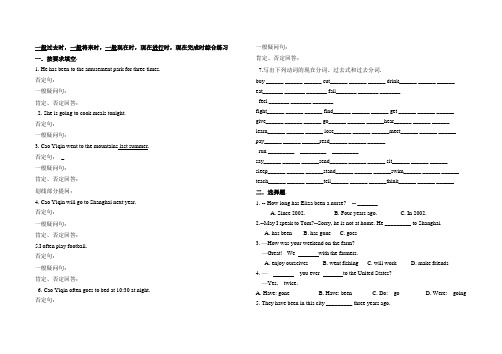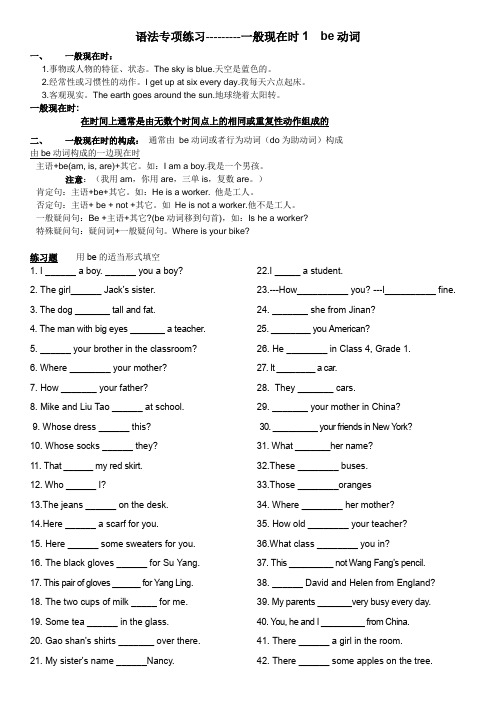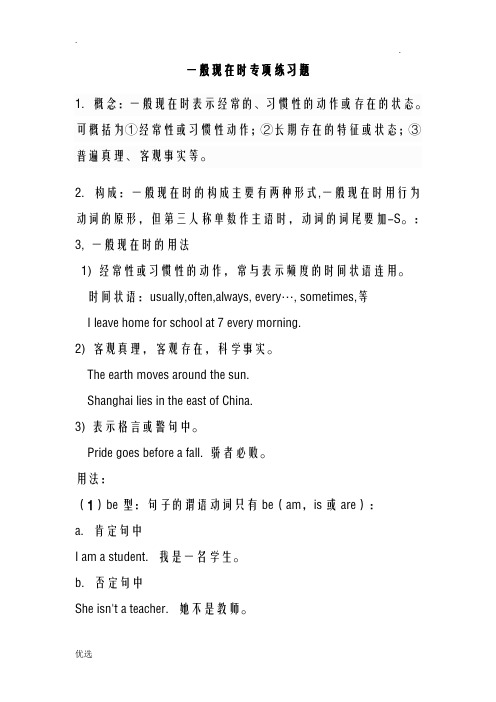一般现在时:一般疑问句和否定句专项练习_共1页
一般现在时-一般过去时-一般将来时-现在完成时综合练习

一般过去时,一般将来时,一般现在时,现在进行时,现在完成时综合练习一.按要求填空.1. He has been to the amusement park for three times.否定句:一般疑问句:肯定、否定回答:2. She is going to cook meals tonight.否定句:一般疑问句:3. Cao Yiqin went to the mountains last summer.否定句:_一般疑问句:肯定、否定回答:划线部分提问:4. Cao Yiqin will go to Shanghai next year.否定句:一般疑问句:肯定、否定回答:5.I often play football.否定句:一般疑问句:肯定、否定回答:6. Cao Yiqin often goes to bed at 10:30 at night.否定句:一般疑问句:肯定、否定回答:7.写出下列动词的现在分词、过去式和过去分词.buy ______ ______ ______ cut______ ______ ______ drink______ ______ ______eat_______ _______ _______ fall_______ _______ _______feel _______ _______ _______fight______ ______ ______ find______ ______ ______ get ______ ______ ______ give______ ______ ______ go______ ______ ______hear______ ______ ______learn______ ______ ______ lose______ ______ ______meet______ ______ ______ pay______ ______ ______read______ ______ ______run _________ _________ _________say______ ______ ______send______ ______ ______ sit______ ______ ______sleep______ ______ ______stand______ ______ ______swim______ ______ ______ teach______ ______ ______tell______ ______ ______think______ ______ ______ 二.选择题.1. -- How long has Eliza been a nurse? -- _______A. Since 2002.B. Four years ago.C. In 2002.2.--May I speak to Tom?--Sorry, he is not at home. He _________ to Shanghai.A. has beenB. has goneC. goes3. —How was your weekend on the farm?—Great! We with the farmers.A. enjoy ourselvesB. went fishingC. will workD. make friends4. —you ever to the United States?—Yes, twice.A. Have: goneB. Have: beenC. Do: goD. Were: going5. They have been in this city _________ three years ago.A. forB. aboutC. since6. ―have you been learning English?―I have been learning English for six years.A. How longB. How oftenC. How far7.--Where is Zhang Ming?-- Oh, he _____ to Beijng and he will be back tomorrow.A. has beenB. has goneC. goes8. The Greens____supper now. A:is having B:are;having C:is haveing9.____you usually _____to school with classmates?A. Do, comesB. does, comeC. Do, come10.Mr Green usually______newspapers after supper every day.A. readB. readingC. reads11.______Helen____________(wash )clothes? Yes ,she is .A. Is, washingB. Does , washC. Is, washes12. There ________ a dolphin show in the zoo tomorrow evening.A. wasB. is going to haveC. will haveD. is going to be13. He ________ her a beautiful hat on her next birthday.A. givesB. gaveC. will givingD. is going to giving14. There __________ a meeting tomorrow afternoon.A. will be going toB. will going to beC. is going to beD. will go to be 三.填空题.1.我母亲通常在星期日打扫卫生、洗衣服。
(完整word)一般现在时句型转换专项练习

Be动词一般现在时专项练习一、用be的适当形式填空1.---How____ you? -—-I____ fine。
2。
I___ David,and my family name___ Green.3。
--—What color ___ your clock?—-—It___ white。
4.---What___ this in English?-—-It___ an apple.5.Toy___my brother。
David____my brother,too。
They ___ my brothers。
6。
Look!These____apple trees.7。
We____ good students and you____ a good teacher.8。
My sister and my brother_____ students。
9. _____there many eggs in the kitchen?10。
____your card number 5578?11.Where_____ your pencils?12.These sweaters ______ fifty dollars。
13。
How much ____ his jacket?14。
My brother’s birthday____ December 11th。
15。
When _____ Kate’s birthday?16、There_____a boy and two girls beside the gate.17、Five and three ____ eight.二、.将下面的句子变成一般疑问句并作出回答1。
That is my football。
2。
Those are his books.3. Jim and Tom are good friends。
4. My birthday is November 1st。
一般现在时用法及专项练习

一般现在时(the simple present tense)一、定义是一种英语语法形式,表示规律性、通常性、习惯性、真理性的动作或状态。
二、结构(一)肯定句1. 主语 + be 动词(am/is/are)+ 其他。
例如:I am a student.(我是一名学生。
)2. 主语 + 动词原形。
例如:We play basketball on weekends.(我们在周末打篮球。
)3.主语(第三人称单数)+动词第三人称单数形式。
一般在动词词尾加 -s 或 -es。
例如:He plays football after school.(他放学后踢足球。
)Tom usually goes to school at 7:30.(汤姆通常7点半去学校。
)(二)否定句1. 主语 + be 动词(am/is/are)not +其他。
例如:I am not a student.(我不是一名学生。
)2. 主语 + do not(don’t) +动词原形。
例如:We do not play basketball on weekends.(我们周末不打篮球。
)3.主语(第三人称单数)does not(doesn’t )+动词原形。
例如:He does not play football after school.(他放学后不踢足球。
)(三)一般疑问句1. Be动词+主语+其他?例如:Is she a student?(她是学生吗?)2. Do/Does + 主语 + 动词原形?例如:Do you play football after school? (你放学后踢足球吗?)Does he work here? (他在这里工作吗?)三、用法1. 描述习惯或重复动作:常与表示频率的时间状语连用。
例如:I get up at 6 o'clock every morning. (我每天早上六点起床。
)He goes to school by bus. (他乘公共汽车上学。
一般现在时态专项训练

一般现在时态一.一般现在时:(现在的状态;经常或习惯性动作;主语所具备的性格和能力;真理。
)1. 标志词:often(经常),usually(通常),sometimes(有时),always(总是),never(从不),on Sundays(在星期天), every day/month/year(每一天/月/年)2、结构:(1)主语+连系动词be(am/is/are)+名词/形容词/数词/介词短语/副词等做表状练习:1.I______(be) a student. My name_____(be) Tom.2. Where _____(be) my shoes? They___(be) here.3.Who ____(be) the girl with long straight hair? I think she ___(be) Kate.4. You and I ___(not be) in Class Six.5.___(be) there a supermarket on the Fifth Avenue? Yes, there_____(be).6. ____ her parent tall? No, he____.(2)主语(非第三人称单数)+行为动词原形+其他(用助动词do 帮助构成否定句、一般疑问句和特殊疑问)(3)主语(第三人称单数)+行为动词的第三人称单数+其他(用助动词does 帮助构成否定句、一般疑问句和特殊疑问句)行为动词第三人称单数加-s的形式1.- s 2. 辅音+y: study-studies 3.以s,x,ch,sh,o结尾watch-watches teach-teaches 4. 特殊have-has do-does go-goes 练习:1. His parents _____ (watch) TV every night. (肯定句)2. My brother _____ (do) homework every day.3. His parents ______ (not watch) every night.(否定句)4. My brother_____ (not do)homework every day.5. _____his parents_____(watch) TV every night?一般Yes, they _______. No, they _______.6. When___ his parents _____(watch) TV? 特疑7. When _____ your brother ____(do) homework?二、动词第三人称单数的变化规则及发音规律动词原形变第三人称单数的规则与发音规律同名词单数变复数大致相同,请认真观察。
一般现在时专项练习题

一般现在时专项练习题1.概念:一般现在时表示经常的、习惯性的动作或存在的状态。
可概括为①经常性或习惯性动作;②长期存在的特征或状态;③普遍真理、客观事实等。
2.构成:一般现在时的构成主要有两种形式,一般现在时用行为动词的原形,但第三人称单数作主语时,动词的词尾要加-S。
:3,一般现在时的用法1)经常性或习惯性的动作,常与表示频度的时间状语连用。
时间状语:usually,often,always, every…, sometimes,等I leave home for school at 7 every morning。
2)客观真理,客观存在,科学事实。
The earth moves around the sun。
Shanghai lies in the east of China。
3)表示格言或警句中。
Pride goes before a fall. 骄者必败。
用法:(1)be型:句子的谓语动词只有be(am,is或are):a.肯定句中I am a student.我是一名学生。
b.否定句中She isn't a teacher.她不是教师.c.一般疑问句,要将be放在句子开头—Are you ready?—你准备好了吗?—Yes,I am.-是的,我准备好了。
(—No,I'm not.—不,我没准备好。
)(2)实义动词型:句中的谓语动词为实义动词(也叫行为动词):a.肯定句中I get up in the morning.我早晨起床。
b.否定句中,I don’t like vegetables.我不喜欢蔬菜。
c.一般疑问句,要在句子开头加助动词Do—Do you like oranges?—你喜欢桔子吗?-Yes,I do.—是的,我喜欢。
(-No,I don’t.-不,我不喜欢。
)2。
主语是第三人称单数时谓语动词的变化。
(特别提一点:不可数名词也算作单数处理)3。
谓语动词的变化规律是:(1)在动词后加-sread — reads,write - writes,say - says(2)以s,x,ch,sh,o 结尾的词加—esteach — teaches,wash - washes,guess – guesses,go— goes,do— does(3)以辅音字母+y结尾的词变y为i再加-estry - tries,carry - carries(4)特殊变化的词be —is have— has主语是第三人称单数句子的变化形式:Tom likes reading books。
小学英语语法专项练习-一般现在时1be动词

语法专项练习---------一般现在时1 be动词一、一般现在时:1.事物或人物的特征、状态。
The sky is blue.天空是蓝色的。
2.经常性或习惯性的动作。
I get up at six every day.我每天六点起床。
3.客观现实。
The earth goes around the sun.地球绕着太阳转。
一般现在时:在时间上通常是由无数个时间点上的相同或重复性动作组成的二、一般现在时的构成:通常由be动词或者行为动词(do为助动词)构成由be动词构成的一边现在时主语+be(am, is, are)+其它。
如:I am a boy.我是一个男孩。
注意:(我用am,你用are,三单is,复数are。
)肯定句:主语+be+其它。
如:He is a worker. 他是工人。
否定句:主语+ be + not +其它。
如He is not a worker.他不是工人。
一般疑问句:Be +主语+其它?(be动词移到句首),如:Is he a worker?特殊疑问句:疑问词+一般疑问句。
Where is your bike?练习题用be的适当形式填空1. I ______ a boy. ______ you a boy?2. The girl______ Jack's sister.3. The dog _______ tall and fat.4. The man with big eyes _______ a teacher.5. ______ your brother in the classroom?6. Where ________ your mother?7. How _______ your father?8. Mike and Liu Tao ______ at school.9. Whose dress ______ this?10. Whose socks ______ they?11. That ______ my red skirt.12. Who ______ I?13.The jeans ______ on the desk.14.Here ______ a scarf for you.15. Here ______ some sweaters for you.16. The black gloves ______ for Su Yang.17. This pair of gloves ______ for Y ang Ling.18. The two cups of milk _____ for me.19. Some tea ______ in the glass.20. Gao shan's shirts _______ over there.21. My sister's name ______Nancy. 22.I _____ a student.23.---How__________ you? ---I__________ fine.24. _______ she from Jinan?25. ________ you American?26. He ________ in Class 4, Grade 1.27. It ________ a car.28. They _______ cars.29. _______ your mother in China?30. _________ your friends in New Y ork?31. What _______her name?32.These ________ buses.33.Those ________oranges34. Where ________ her mother?35. How old ________ your teacher?36.What class ________ you in?37. This _________ not Wang Fang's pencil.38. ______ David and Helen from England?39. My parents _______very busy every day.40. Y ou, he and I _________ from China.41. There ______ a girl in the room.42. There ______ some apples on the tree.43. _______ there any kites in the classroom?44. _______ there any apple juice in the bottle?45. There _______ some bread on the plate. 46. There _______ a boy, two girls, three men andten women in the park.按要求改写句子1. I am a teacher.否定句:一般疑问句:肯定回答:否定回答: 2. They are new students.否定句:一般疑问句:肯定回答:否定回答:3. He is a good boy at home.否定句:一般疑问句:肯定回答:否定回答:4. We are having an English class.否定句:一般疑问句:肯定回答:否定回答:5. Bob is in Class One, Grade Six.否定句:一般疑问句:肯定回答:否定回答:6. She is form Jinan.否定句:一般疑问句:肯定回答:否定回答:7. We are doing our homework.否定句:一般疑问句:肯定回答:否定回答:8. They are in the teacher’s office.否定句:一般疑问句:肯定回答:否定回答:9. His father is a postman.否定句:一般疑问句:肯定回答:否定回答:10. It is sunny today.否定句:一般疑问句:肯定回答:否定回答:11. They are reading books.否定句:一般疑问句:肯定回答:否定回答:12. His brother is a good- looking boy.否定句:一般疑问句:肯定回答:否定回答:。
一般现在时专项练习题

一般现在时专项练习题1.概念:一般现在时表示经常的、习惯性的动作或存在的状态。
可概括为①经常性或习惯性动作;②长期存在的特征或状态;③普遍真理、客观事实等。
2.构成:一般现在时的构成主要有两种形式,一般现在时用行为动词的原形,但第三人称单数作主语时,动词的词尾要加-S。
:3, 一般现在时的用法1) 经常性或习惯性的动作,常与表示频度的时间状语连用。
时间状语:usually,often,always, every…, sometimes,等I leave home for school at 7 every morning.2) 客观真理,客观存在,科学事实。
The earth moves around the sun.Shanghai lies in the east of China.3) 表示格言或警句中。
Pride goes before a fall. 骄者必败。
用法:(1)be型:句子的谓语动词只有be(am,is或are):a.肯定句中I am a student.我是一名学生。
b.否定句中She isn't a teacher.她不是教师。
c.一般疑问句,要将be放在句子开头—Are you ready?—你准备好了吗?—Yes,I am.—是的,我准备好了。
(—No,I'm not.—不,我没准备好。
)(2)实义动词型:句中的谓语动词为实义动词(也叫行为动词):a.肯定句中I get up in the morning.我早晨起床。
b.否定句中,I don't like vegetables.我不喜欢蔬菜。
c.一般疑问句,要在句子开头加助动词Do—Do you like oranges?—你喜欢桔子吗?—Yes,I do.—是的,我喜欢。
(—No,I don't.—不,我不喜欢。
)2.主语是第三人称单数时谓语动词的变化。
(特别提一点:不可数名词也算作单数处理)3.谓语动词的变化规律是:(1) 在动词后加-sread - reads,write - writes,say - says(2) 以s,x,ch,sh,o 结尾的词加-esteach - teaches,wash - washes,guess – guesses,go—goes,do—does(3) 以辅音字母+y结尾的词变y为i再加-estry - tries,carry - carries(4) 特殊变化的词be —is have—has主语是第三人称单数句子的变化形式:Tom likes reading books.Tom doesn’t like reading books.(否定句)Does Tom like reading books"(疑问句)Yes,he does./No,he doesn’t.(肯定回答和否定回答)练习题:(一)单选:1. WhereLucy e from"A. doB. doesC. isD. are2. Most of the students China.A. es fromB. is fromC. are fromD. e of3. We speak English .A. every daysB. everydayC. very dayD. every day4. My math teacher a big pair of glasses.A. wearsB. put onC. wearD. puts on5. What your father and mother "A. does, doB. do, doC. are, doD. do, does(二)用动词适当形式填空:1. His radio is broken. It (sound)terrible.3. Every year my parents (give)me a present for my birthday.4. The club (send)her a letter every month.5. your dad (wash)his car every week" Yes, he does.6. Lin Tao is a good student. He (study)very hard.7. They (work)at the bank.(三)句型转换:1. My living room has three windows. (改为否定句)2. Jim and Jack like swimming on Sundays.(就划线部分提问)3. We are in the same class. (改为一般疑问句)4. He es from England.(就划线部分提问)一、用所给动词的适当形式填空。
一般疑问句和否定句

一般疑问句,否定句课题一:一般疑问句general question重点:辨别一般疑问句,掌握一般疑问句语法结构和使用方法。
难点:1.一般疑问句的句子结构。
2.一般疑问句和陈述句之间的转化。
动词时态的变化。
教具准备:教学讲义练习题。
教学过程:1.复习:P17,P32重新朗读课文。
复习单词和语法。
2.提出课题:Does...like...(doing)?Yes,...does./No,...doesn’t.Is/Are...(doing)?Yes,...is/are./No,...isn’t/aren’t.由以上例句总结一下一般疑问句的定义:一般疑问句是疑问句的一种。
它是一般只用yes (是)或no(否)来回答的句子。
朗读一般疑问句时用升调。
3.教学步骤:a.举出更多例句.Eg1. 问句:Is this your pen?肯答:Yes,it is.否答:No,it isn`t.Eg2. 问句:Are these your books?肯答:Yes,they are.否答:No,they aren’t.Eg3. 问句:Can you speak English?肯答:Yes,I can.否答:No,I can’t.Eg4. 问句:Do you like apple?肯答:Yes,I do.否答:No,I don’t.b.总结一下一般疑问的句子结构及回答。
(句子结构的记忆方法:就是讲前面2个词调换位置了。
)Is/Are+主语+其他部分? 。
是。
?Eg1. Is this your pen?当只有一支笔的时候就用Is, 回答:Yes,it is/No,it isn’t .当有两只及以上用时用Are,而且要讲这个(this)/那个(that)变为这些(these)/那些(those).笔要加s变成复数。
如:Are these/those your pens?回答:Yes,they are/No,they aren’t.② Can/Will+主语+V-原型? (后面动词都用原型)Eg. You can open the door→Can you open the door?You will go to school next Monday →Will you go to school next Monday ?③Do/Does+主语+V-原型?Eg. Do you like apple?Does Mary like cat?第一,二人称(I,You)用Do; 第三人称(Mary)用DoesParents等复数也用Do.举例:我需要现在回家吗?Do i need to go home now?回答:你父母喜欢英语吗?Do your parents like English?Alice喜欢花吗?Does Alice like flower?C.辨别以下是否为一般疑问句。
- 1、下载文档前请自行甄别文档内容的完整性,平台不提供额外的编辑、内容补充、找答案等附加服务。
- 2、"仅部分预览"的文档,不可在线预览部分如存在完整性等问题,可反馈申请退款(可完整预览的文档不适用该条件!)。
- 3、如文档侵犯您的权益,请联系客服反馈,我们会尽快为您处理(人工客服工作时间:9:00-18:30)。
易错题: He does his homework at home. He _____ _____ his homework at home. (变否定句) ______he_______ his homework at home. ( 变一般疑问句)
练习题:
1. His father is an English teacher.
一般现在时
一般现在时定义:1.经常性或习惯性的动作或状态。2.普遍真理,客观事实。 一般现在时结构:一般现在时主要有两种形式(be 型, 和 实义动词型)。即 be 动词根据人称用 am is are. 实意 动词根据人称和数用单数形式或复数形式。 注意:在动词后加上 s 或者 es 才是单数形式。 复数形式不加。与名词变复数相反。
否定句: ___________________________________________
10. There is a big shop near our school.
一般疑问句:___________________________________________ ?
否定句: ___________________________________________
11. Kitty is wearing new uniform.
一般疑问句:___________________________________________ ?
否定句: ___________________________________________
12. The boy under the tree(树) is hungry.(饥饿) 一般疑问句:___________________________________________ ?
考点: 一般疑问句和否定句 变一般疑问句 变否定句
Be 型 把 am/is/are 提至句首,变人称一变 二。 在 am/is/are 后加 not
实意动词型 将 do/does 至于句首,其后动词用原 形。人称一变二 直接找到动词,在动词前家 don’t 或 者 doesn’t, 将动词变原形。 其他照 抄。
4. I like to read(阅读) English.
一般疑问句:___________________________________________ ?
否定句: ___________________________________________
5. Tom goes to school on foot.(走路)
一般疑问句: ___________________________________________ ?
否定句: ___________________________________________
2. These cats are crying.(喊叫)
一般疑问句:___________________________________________ ?
否定句: ___________________________________________
3. You had better go out for a walk .
一般疑问句: ___________________________________________ ?
否定句: ___________________________________________
否定句: ___________________________________________
13. He goes to school every day.
一般疑问句:___________________________________________ ?
否定句: ___________________________________________
7. His father goes to work by bus.(乘公共汽车 一般疑问句: ___________________________________________ ?
否定句: ___________________________________________
8. He is crying(哭) under the tree.
一般疑问句:___________________________________________ ?
否定句: ___________________________________________
9. His birthday is on the twentieth of November. 一般疑问句:___________________________________________ ?
一般疑问句: __________________________________________ ?
否定句: ___________________________________________
6. He likes English.
一般疑问句:___________________________________________ ?
